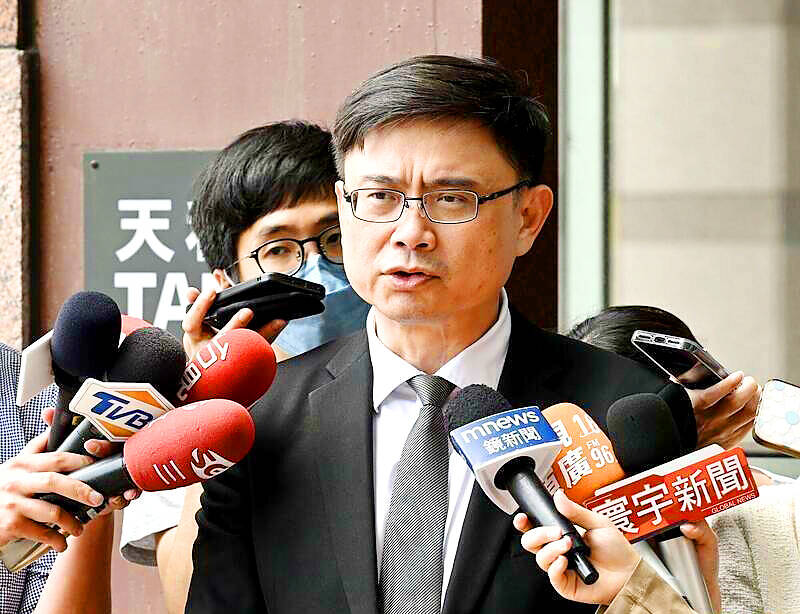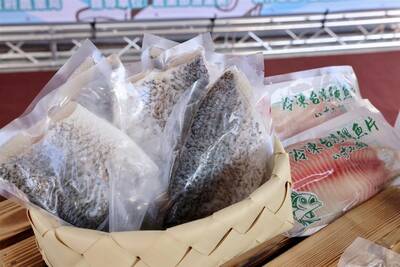Democratic Progressive Party (DPP) lawmakers have proposed amendments to prevent lawmakers from leaking confidential material concerning important state matters and national security.
The amendments proposed by DPP legislators Lai Jui-lung (賴瑞隆) and Chung Chia-pin (鍾佳濱), as well as fellow party members, aim to address loopholes in the Organic Act of the Legislative Yuan (立法院組織法) and Legislators’ Conduct Act (立法委員行為法).
The amendments would require lawmakers, ministry officials, legislative clerks and stenographers attending closed-door legislative meetings to sign a non-disclosure agreement before being allowed entry, and would prohibit them from bringing in mobile phones and other telecommunication devices.

Photo: Taipei Times
The amendments are needed to protect sensitive government information and highly classified materials related to the military, national defense and state intelligence agencies, Chung said.
“If the Chinese Nationalist Party (KMT) and Taiwan People’s Party (TPP) want to expand their authority ... then they have an obligation not to divulge our nation’s secrets,” he said.
Chung was referring to the KMT’s and TPP’s attempts to amend the Rules of Procedure of the Legislative Yuan (立法院議事規則) to give lawmakers the power to hold investigative hearings.
Chung said he would like to create four legal “protective firewalls” to prevent lawmakers from leaking state secrets and colluding with enemy forces, by patching loopholes in the Classified National Security Information Protection Act (國家機密保護法), Rules of Procedure of the Legislative Yuan, Legislators’ Conduct Act and the Act Governing Relations Between the People of the Taiwan Area and the Mainland Area (台灣地區與大陸地區人民關係條例).
The proposed amendments would also require lawmakers and their aides to report to the legislature’s secretariat when traveling to China, Hong Kong and Macau, during the legislative session.
Such information would be made available to the public, and a judicial investigation would be conducted if lawmakers contravene the regulation.

Taiwan's Vice President Hsiao Bi-khim (蕭美琴) said Saturday that she would not be intimidated by the Chinese Communist Party (CCP), following reports that Chinese agents planned to ram her car during a visit to the Czech Republic last year. "I had a great visit to Prague & thank the Czech authorities for their hospitality & ensuring my safety," Hsiao said on social media platform X. "The CCP's unlawful activities will NOT intimidate me from voicing Taiwan's interests in the international community," she wrote. Hsiao visited the Czech Republic on March 18 last year as vice president-elect and met with Czech Senate leadership, including

There have been clear signs of Chinese Communist Party (CCP) attempts to interfere in the nationwide recall vote on July 26 in support of Chinese Nationalist Party (KMT) legislators facing recall, an unnamed government official said, warning about possible further actions. The CCP is actively involved in Taiwanese politics, and interference in the recall vote is to be expected, with multiple Chinese state media and TAO attempts to discredit the Democratic Progressive Party (DPP) and undermine public support of their recall movement, the official said. This interference includes a smear campaign initiated this month by a pro-Beijing Hong Kong news outlet against

A week-long exhibition on modern Tibetan history and the Dalai Lama’s global advocacy opened yesterday in Taipei, featuring quotes and artworks highlighting human rights and China’s ongoing repression of Tibetans, Hong Kongers and Uighurs. The exhibition, the first organized by the Human Rights Network for Tibet and Taiwan (HRNTT), is titled “From the Snowy Ridges to the Ocean of Wisdom.” “It would be impossible for Tibetans inside Tibet to hold an exhibition like this — we can do it. because we live in a free and democratic country,” HRNTT secretary-general Tashi Tsering said. Tashi Tsering, a Taiwan-based Tibetan who has never

A first shipment of five tons of Taiwan tilapia was sent from Tainan to Singapore on Wednesday, following an order valued at NT$600,000 (US$20,500) placed with a company in the city. The products, including frozen whole fish and pre- cooked fish belly, were dispatched from Jiangjun Fishing Harbor, where a new aquatic processing and logistics center is under construction. At the launch, Tainan Mayor Huang Wei-che (黃偉哲) called the move a “breakthrough,” marking Taiwan’s expansion into the Singaporean tilapia market. Taiwan’s tilapia exports have traditionally focused on the United States, Canada, and the Middle East, Huang said, adding that the new foothold in